by Joy | Jul 19, 2016
I’ve been in medical school for 11 months and 15 days. For the past couple of months, I’ve found fewer and fewer things shock me. I’d like to think it’s a good thing—I’ve become acclimated to the medical community and a quarter of a way closer to becoming a physician. But mainly it seems as if I’ve just become more desensitized.

During the first few months of medical school, everything seems novel and eye-opening. It’s not about the practice of medicine per say – everyone probably has done a fair amount of shadowing prior to entering medical school. It’s more about the fact that you’re embarking on a journey in which you become responsible for the lives of someone else. There’s something magical in that.
As such, many things take on new meaning when I started medical school. When talking to a patient, I wasn’t just talking to a patient, but to someone who could someday be someone like my patient. A HPI became not just a series of meaningless random questions, but a systemic process that would help me reach a diagnosis. Patient panels were more riveting than an episode of Game of Thrones. And then of course, there was anatomy.

Admiring peonies in bloom at Nichols Arboretum
There are few things as defining about medical school as anatomy. It seemed like all along the interview trail, medical schools were showing anatomy labs as part of their campus tours – although I never really understood why. But looking back over the year, even though I’ve long forgotten what happened during our 2 weeks of orientation or details of our doctoring sessions, I still distinctly remember the first time we walked into the anatomy lab and looked at the face of our donor.
As I made the first cut into the back of our cadaver, there was a deep sense of awe and also a bit of fear too. What we were doing did not seem natural – it felt as if I was breaking some unspoken rule of the universe – I couldn’t help but see a face to my donor. Even though the feeling faded over time, I still remember feeling a faint sense of unease throughout the first half of the year. But somewhere along the way, instead of being novel, a lot of things became the new normal.
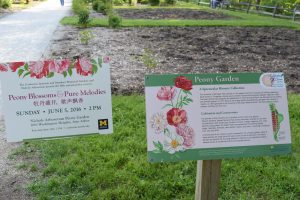 It isn’t the first time for me where things once novel became “normal” or part of a routine. After I graduated college, I joined Teach For America (TFA). My first few months teaching were utter chaos – I had students throwing water bottles at each other and totally ignoring me during the lesson. It was dark outside when I got up and equally dark when I got back to write my lesson plans for the next day. While I didn’t necessarily mind the long hours, the sense of feeling completely out of my comfort zone and that I was making little difference was difficult. But as the weeks went by, even the utter chaos that was my classroom became normal in that I could almost no longer perceive the destructive patterns. Sometimes looking back, I wonder how something so crazy could have ever become “normal”?
It isn’t the first time for me where things once novel became “normal” or part of a routine. After I graduated college, I joined Teach For America (TFA). My first few months teaching were utter chaos – I had students throwing water bottles at each other and totally ignoring me during the lesson. It was dark outside when I got up and equally dark when I got back to write my lesson plans for the next day. While I didn’t necessarily mind the long hours, the sense of feeling completely out of my comfort zone and that I was making little difference was difficult. But as the weeks went by, even the utter chaos that was my classroom became normal in that I could almost no longer perceive the destructive patterns. Sometimes looking back, I wonder how something so crazy could have ever become “normal”?
Perhaps it is a coping mechanism that allows us to see things once shocking as normal – at least that is what we often thought in TFA. It could be also why we are able to dissect the face at the end of the year in anatomy when even looking at the cadaver in the beginning of the year fazed so many of us.
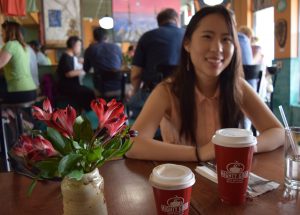
Enjoying a relaxing Saturday morning at Juicy Kitchen
But what do you do when the “newness” of something wears off? Is the feeling of things being “normal” even justified? For me, in teaching, it was clearly a no. It was wrong that I had come to see a dysfunctional classroom as typical. But it took me the summer when I finally had time to take a seat back and contemplate the year as a whole to figure that out. When I started my second year of teaching while I might not have been as green or untried as I was in my first year, I was still just as ready for an adventure and able to recapture some of the feeling of novelty to teaching that had seemed to fade towards the end of my first year. While I think some amount of acclimation and acceptance is helpful – it helps me do things I would otherwise be too paralyzed in fear to do, some amount of everlasting feeling of newness is needed too to keep me on my toes. I’d like to take this summer to recapture some of the magic so to say.
by Nonie | Jul 14, 2016
In June, I travelled to Nashville, TN with a group of high school students for the HOSA International Leadership Conference. I loved interacting with students who are interested in medical fields, including public health, physical therapy, nursing, clinical medicine, and more!
The students who attended the conference had already qualified from through multiple rounds of competition at their local and state levels. I had the opportunity to attend as a chaperone after learning about the conference from my sister who attended as a competitor. The events that students competed in varied, and included topics that are applied, such as sports medicine. (Side note: I was amazed that one of the other chaperones injured her ankle, one of the high school students knew exactly how to tape it!) Other students also competed in events where they had to create a public service announcement or public health outreach program in their community.
While I was there chaperoning kids from my old high school (Novi), I also had the opportunity to judge the Biomedical Debate event. The debate topic was whether the benefits of genetically modified foods outweigh the harms. This is very relevant topic given the recent legislation proposed (at the time of this event) and passed by the House (now) that requires the labeling of some GMO foods. It was also the perfect event for me to judge given my concentration in Genome Sciences & Policy as an undergrad at Duke. I was very impressed by students’ quality of preparation and research! I knew that they were doing an excellent job because I found myself being swayed to the affirmative or negative side depending on the quality of their arguments in each round.
Finally, I wouldn’t be the proud older sister that I am if I didn’t mention that my sister’s team placed fourth in the category of Community Awareness! So exciting! As a whole, Novi High School had 27 top 10 finalists, one 3rd place finish, and three 2nd place finishes. What an amazing crew.
In addition to all the conference programming, we also had the chance to go line dancing. Now, back in Ann Arbor I am excitedly awaiting the arrival of the new M1s!
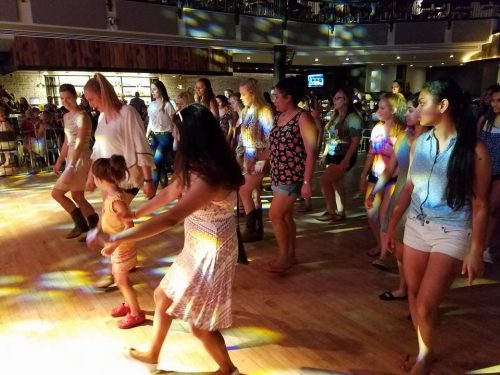
Line Dancing in Nashville
by Sara | Jul 11, 2016
Yesterday was the annual Dean’s Cup golf outing generously sponsored by the medical school, and it was so much fun! The weather was beautiful, and the company even better! The scramble format and foursomes consisting of a faculty member and three students make the tournament accessible to golfers of all abilities, but the best part is definitely spending several hours in the company of your fellow students and faculty outside of the sometimes-hierarchical hospital setting.
Plus, it’s a time to break out these snazzy pants 🙂 When the faculty member I played with asked why I chose to wear them, I asked if I should instead wear them as an M3 on the wards. His response: laughter. I agreed completely…
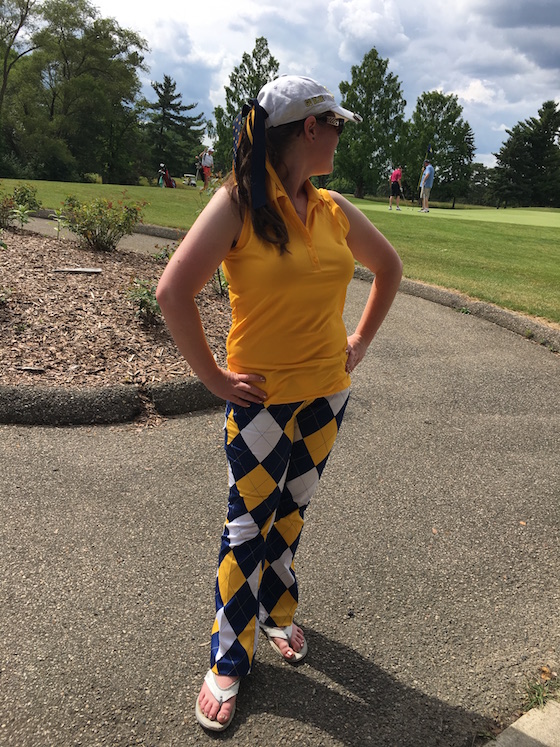
After yesterday’s interlude away, I was back to the hospital today starting on the Neurology clerkship. Since all M3 clerkship lengths have been cut by 25% starting this year, Neuro lasts three weeks, and I rotate to a different service at the end of each week. For now, I’m on Inpatient Team B and, along with my two med student compatriots, will be working for the most part directly with an attending physician. Although it’s early, I suspect this week will be enjoyable and informative – the attending clearly enjoys teaching us and I now understand the myriad MRI scan types better than ever before. I am absolutely looking forward to what lies in store for me!
by Angelica | Jul 3, 2016
Hello again! It’s been a while since I last posted, so it seems like it’s about time for an update. We’re now 8 weeks into rotations, and life couldn’t be busier or better.
About two weeks ago, I finished pediatrics, which was my first rotation. I was definitely nervous to start seeing patients at the start of the rotation, but the interns, residents, and faculty I worked with quickly put me at ease. Kids are sometimes a difficult population to work with because they can’t always tell you what’s wrong, and it can take a fair amount of detective work to determine what is making them sick. However, peds can also be quite fun. I actually really liked the rotation. It made the public health part of me happy because there is such a huge focus on prevention and building healthy habits, and kiddos are just really fun to work with. I was able to be silly and playful, and there were a lot of stickers involved. One of the best moments of peds was when a kiddo told me that I was his favorite “doctor” ever (cue my heart absolutely melting). While the sad cases are incredibly heartbreaking, the majority of issues that bring kiddos to the hospital or clinic are fixable, and that means that peds is a happy rotation for the most part. The interns, residents, and faculty were also fantastic and made the rotation fun for everyone involved.
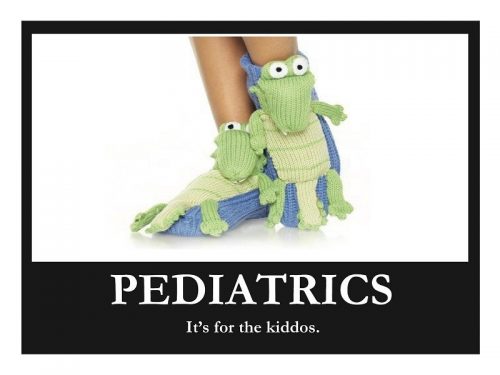
Truer words were never spoken.
From: http://gomerblog.com/2015/06/medical-specialty-part2/
Two weeks ago, I shifted gears and started surgery. Surgery is at the complete opposite end of the spectrum from peds, and the transition was a bit startling. However, once I got over that, I realized that surgery is also really interesting. The OR feels like an incredibly well-choreographed dance in which everyone involved moves around each other like a well-oiled machine. I can now say that I’ve seen the inside of a living person, and that is a pretty amazing thing. I often stand in awe as the surgeons and residents maneuver laparoscopic tools with ease or suture and throw knots faster than I could imagine. It’s clear that they have had years of practice, and that’s not at all difficult to respect. There is a certain rush to being in the OR, and I love that I am able to experience it.
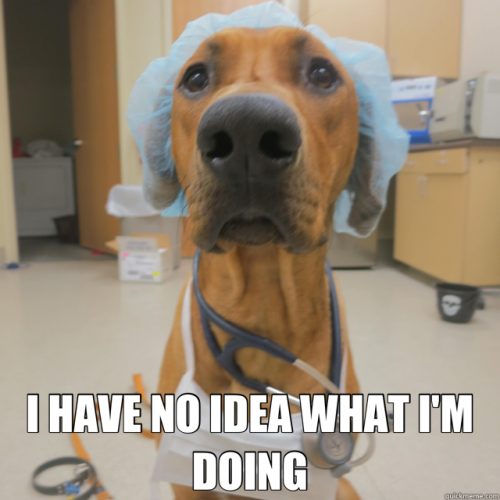
How I felt the first day of surgery… From: http://whatshouldwecallmedschool.tumblr.com/post/72672166657/first-day-of-the-surgery-rotation
The start of rotations has been amazing, and I’m excited for what is to come. Each rotation brings new lessons, and every rotation teaches me something that I will one day incorporate into my practice regardless of what specialty I choose in the future. Most of all, I am enjoying my time with patients, and I would take a day on the wards over the first two years of med school any day. I realize that there is so much that I don’t know, and I look forward to learning something new every day. I found this hilarious video that explains M3 year in a nutshell. Enjoy!
As always, thanks for reading! Until the next time, happy summer!
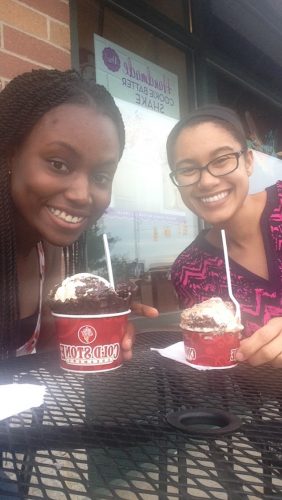
Ice cream after a long day on the wards
by Ting | Jun 30, 2016
Poetry.
Before you skip over this post because of the previous sentence, I want you to think about something that fascinated you far more than you thought it would. That’s what I think poetry is for most people: that interesting thing that they never knew existed. I truly, maybe a little naively, believe that those who don’t like poetry just haven’t been exposed to the poems that they would like. And there’s a lot of poetry out there, far more than what the volumes on that one shelf at your nearest major book retailer might suggest. (I had originally titled this post “The poetry section at major bookstores makes me really sad,” but then I realized that THAT was one way to make sure no one reads this post!)
I recently finished Step 2. I’m officially an M4 now. Like the characters in the title short story I recently read from Anthony Doerr’s amazing 2002 collection The Shell Collector, who are bitten and rendered briefly comatose by a venomous sea snail, I’m in shock. I took Step 2 on Monday, and for the past three days, all I’ve done is read (I’m on my vacation month). They say that there are two types of people: those who read to remember, and those who read to forget. What about those who read to figure out what they want to do for the rest of their lives? In which camp do the nuances of that desire fall?
In truth, I know what my next four years will look like. I am ecstatic to have found, through my M3 year, the medical field that I will go into. I also know that I will be writing poetry. And here is where a less stubborn version of myself might throw up her hands and say, “This- this is not happening” — “This” meaning a career path that lets me combine my love of medicine and poetry into something that (can I say this without sounding completely delusional) could be helpful to both fields. I can’t say that it’s been easy so far– being a medical student and a writer. “I’m a poet” is not something that I volunteer on the wards, mostly because that’s like randomly telling people that you love kayaking or have a fondness for turtles in the middle of a conversation about your career ambitions. Because, despite the successful integration of creative pursuits and medical careers by physician-writers such as Atul Gawande, Amit Majudar, C. Dale Young, Rafael Campo, and so many, many more, creative writing is still seen as being separate from medicine, as evidenced by the furrowed brows and blank stares I’ve received on clerkships in response to the phrase “I write poetry” (sometimes also to the phrase, “I like to write,” at which point I’m like, This…is going to be a long two weeks). When I’m feeling adventurous, I will tell attendings or residents that I write poetry, but for the most part, I don’t bring it up unless asked about hobbies or interests outside of medicine (and instead use my energy to plan events that integrate medicine and the arts, like this one with the poet and internist Rafael Campo back in March: http://www.literatibookstore.com/event/site-humanism-and-ethics-night) Small but gradual change!
What this gap between medicine and the arts boils down to, for me, is an awareness gap. Just as you might hypothetically think that all the poetry in the world is of one homogeneous note if you only consider the poems in your high school literature textbook (was going to write, “the poetry section at the major book store,” but then realized that probably NO ONE besides writers look at, and cry over, that section), so might physicians, when it comes to possibilities within a medical career. What does this mean for me, an M4? As I go through this year, I hope to continue to work with the Medicine and the Arts Program to plan events that bring physicians and medical students together with writers. I’ll work on my IMPACT project, a collection of poems about dementia (more about that in a later post). I’ll mentor some of my peers within the Medical Humanities Path of Excellence, for which I’m planning a lesson that involves reflection and writing. I’ll continue to learn, and think, and write. It’s unfamiliar territory for most, but that’s what makes it exciting–at least, definitely, to me!
~
Ting Gou is an M4. Her first collection of poems, The Other House, is forthcoming in the Delphi Poetry Series from Blue Lyra Press this November. Her poems have been nominated for the Pushcart Prize three times and can be found in various literary and medical journals.
by Nonie | Jun 28, 2016
Earlier this month, a group of UMMS students travelled to Chicago, IL for the AMA Annual Meeting as delegates from our school to the medical student section.
In addition to voting on policy issues that affect medical students, physicians, and patients, we also attended educational sessions such as “professional advocacy in an election year” and “outbreaks and the olympics,” which was focused on the Zika virus and other communicable diseases.
One of my favorite parts of the weekend was attending the AMA Healthier Nation Innovation Challenge finals. There, we had the opportunity to hear from innovative startups about how they are solving pressing issues in healthcare.
These remarkable projects ranged from a technology solution that empowers first responders to share real-time patient data with healthcare providers in hospitals (Twiage) to a novel catheter that self-disinfects using phototherapy. Amazing solutions that are widely applicable!
The final day of the conference we attended reference committee meetings for the House of Delegates, which is the full voting body of the AMA. I particularly enjoyed hearing and live tweeting the debate on the End Step 2CS resolution that Andy Zureick (M4 from UMMS) and other students and physicians from across the country had been working hard on. Step 2 Clinical Skills has not been shown to improve patient care or education quality, has an extremely high pass rate, yet costs medical students over a thousand dollars plus travel time and expenses. The proposal to advocate for elimination of this exam in its current form was passed in a form that combined four separate resolutions with the same intent.
We are all grateful to the Washtenaw County Medical Society and the Michigan State Medical Society for providing funding without which we may not have been able to attend! I look forward to continuing to work on AMA projects: Andy and I were elected to leadership roles at the Regional level. He will be serving as our region 5 vice chair and will be serving as our region 5 AMA foundation liasion.
Attending this meeting was incredible opportunity to partipate in policy-making and connect with students and physicians across the country. I left feeling more energized to lend my voice and enthusiasm to organized medicine & health policy!
 It isn’t the first time for me where things once novel became “normal” or part of a routine. After I graduated college, I joined Teach For America (TFA). My first few months teaching were utter chaos – I had students throwing water bottles at each other and totally ignoring me during the lesson. It was dark outside when I got up and equally dark when I got back to write my lesson plans for the next day. While I didn’t necessarily mind the long hours, the sense of feeling completely out of my comfort zone and that I was making little difference was difficult. But as the weeks went by, even the utter chaos that was my classroom became normal in that I could almost no longer perceive the destructive patterns. Sometimes looking back, I wonder how something so crazy could have ever become “normal”?
It isn’t the first time for me where things once novel became “normal” or part of a routine. After I graduated college, I joined Teach For America (TFA). My first few months teaching were utter chaos – I had students throwing water bottles at each other and totally ignoring me during the lesson. It was dark outside when I got up and equally dark when I got back to write my lesson plans for the next day. While I didn’t necessarily mind the long hours, the sense of feeling completely out of my comfort zone and that I was making little difference was difficult. But as the weeks went by, even the utter chaos that was my classroom became normal in that I could almost no longer perceive the destructive patterns. Sometimes looking back, I wonder how something so crazy could have ever become “normal”?







